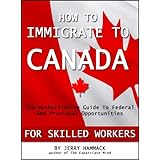The March 25th issue of McLean's Magazine includes an article titled, "Why Canada doesn't work", which discusses the employment environment in this country, and what is perceived as a trend toward "people without jobs, and jobs without people."
What is covered in the article is the landscape from the point of view of employers who need skilled workers (in both the white-collar professional jobs and skilled trades), and the response to this need by educators and by government through the focus of education and immigration programs. It also discusses the barriers that employees, particularly skilled immigrants, face through the credentialing maze of requirements.
And while McLean's questions the government, and questions universities and trade schools about their responses to the demand and future shortages of workers to keep Canada moving forward, there is one glaring hole in their coverage: just what is the employers responsibility here?
Aren't employers the ones who's products and services are created and provided by the employees that fill these jobs? Isn't training a cost of doing business anymore? It seems that employers want that burden to be carried by the government or by the potential employee. The government; through programs that provide funding for training, or immigration opportunities to people with the right skill set for a particular job. The employee; through choosing the right education at the right time to get the right job - which is in all honesty, a crap-shoot.
I remember a time when the right person for a job was the person capable and responsible enough to learn what the work required, and diligent enough to show up for that work each day, providing value to their employer. Seems that's not the case any more. That situation required risk by the employer, coupled with an investment in training. I read recently that if you took into account the basic job requirements for open positions in the tech sector, neither Bill Gates, nor Steve Jobs would have a chance of getting hired for today's jobs. What does that tell you?
It's time that the government and the press pushed back on employers to challenge and change their mindset about who is truly eligible to fill the myriad of open positions in this country. Seems to me that if someone can dedicate their efforts to an undergraduate degree, or to a technical school education, that they are capable of learning and excelling in a wide range of jobs. It seems to me, that is someone is ambitious enough to leave their home for another to pursue opportunities, they would be ambitious enough to help a wide range of companies.
All they need is what we used to call "an opportunity".



